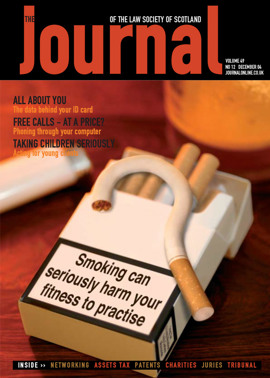The stupidest in the world?
A lawyer like me, practising media law, experiences our judges regarding juries as absolute morons. The draconian contempt of court rules in Scotland, the most restrictive in the world, proceed on the basis that the entire Scottish public is composed of idiots who cannot cope with any information pre-trial. The refreshing attitude of Lord Prosser in Cox & Griffiths in 1998 – “Juries are healthy bodies, they do not require a germ-free atmosphere” – has, sadly, not signalled the start of a new approach. Put simply, if our judges are right when dealing with contempt law, Scotland has the stupidest citizens of any country in the world.
But, strangely, the same judges suddenly imbue the same citizens with near God-like qualities when they are actually empanelled as arbiters of fact in criminal and civil cases. Detailed arguments on liability or quantum are not too much for these good men/women and true. Multi-faceted frauds which have outsmarted savvy corporate conglomerates become within their ken.
Can this seeming contradiction be right? Of course it isn’t. Juries are neither as stupid as judges believe with regard to pre-trial publicity, nor nearly as clever as judges believe (or pretend to believe) in determining complicated civil or criminal cases. As usual, the truth is somewhere in the middle.
On pre-trial publicity to some extent this has been recognised by the Privy Council, where in Montgomery and Coulter (the Chhokar case) Lord Hope observed that research carried out in New Zealand, which he described as a very similar country socially to Scotland, showed that juries pay no attention whatsoever to pre-trial publicity when determining guilt or innocence in criminal cases.
The whole basis of the jury system is that jurors use their commonsense judgment based on their experience. But unless they are research scientists, the vast majority of the public are not asked to reach fine judgments from masses of detailed information in their personal or business lives. The English courts recognised this years ago in the Blue Arrow appeal, where it was accepted at all hands that the jury could not possibly have understood the judge’s charge. An acquittal was recorded and millions of pounds of public money wasted, as often happens in fraud trials. I have never spoken to a lawyer on either side involved in a long fraud trial who thought the jury understood anything about the case. Similarly, to return to my own area, awards of damages in the English courts in defamation cases have been so embarrassingly huge that the Court of Appeal has had to intervene repeatedly. Scottish juries are not innocent of excessive awards of damages either.
The Transco case will go before a jury, despite the complexity of the question of criminal liability in a case involving a gas explosion. The Lockerbie trial would have been an absolute farce had it been conducted before a jury. There, there were 84 days of complicated evidence, much of it leading edge aviation and explosive science.
Jury research carried out in Canada and America produces frightening results. The filmed deliberations of jurors, earnestly trying to carry out their job properly, demonstrate their total failure to understand the issues before them. They make up their minds primarily on the basis of the opening remarks of counsel – a stupid procedure which, happily, we do not allow in Scotland. The very existence of these American jury research companies providing assistance to lawyers to aid the jury selection process indicates that jurors decide cases according to pre-ordained biases, rather than on facts.
It seems to be within the Scottish Parliament’s powers to repeal the section of the Contempt of Court Act which prohibits jury research in Scotland. If a full, as opposed to a piecemeal, investigation into the needs of our criminal justice system were to be carried out, the matter of juries should be a priority. A jury trial may well still be an appropriate mode of fact-finding in certain criminal cases, but it is certainly wrong in complicated criminal trials – and if they are to be retained at all in civil cases, they should be relieved of their power to assess damages.
The idea of removing juries from certain criminal cases will be greeted by defence practitioners with horror. They know that a good number of Scottish judges, particularly some sheriffs and JPs, are so Crown-minded that they would convict on evidence of quite woeful quality. But that is a problem outwith the ambit of what I am trying to address here.
In this issue
- Dear Father Christmas
- The stupidest in the world?
- No butts, no doubts, no regrets
- Bigger Brother
- Born to instruct
- Caught in the net
- A defining era
- 12 tips for Christmas networking
- Phoning for nothing and your clicks for free
- Be prepared
- Some fine tuning
- Brave new world
- Are all bets off for BHB?
- Clash of the Conventions
- Scottish Solicitors' Discipline Tribunal
- Website reviews
- Book reviews
- Farming right to buy






